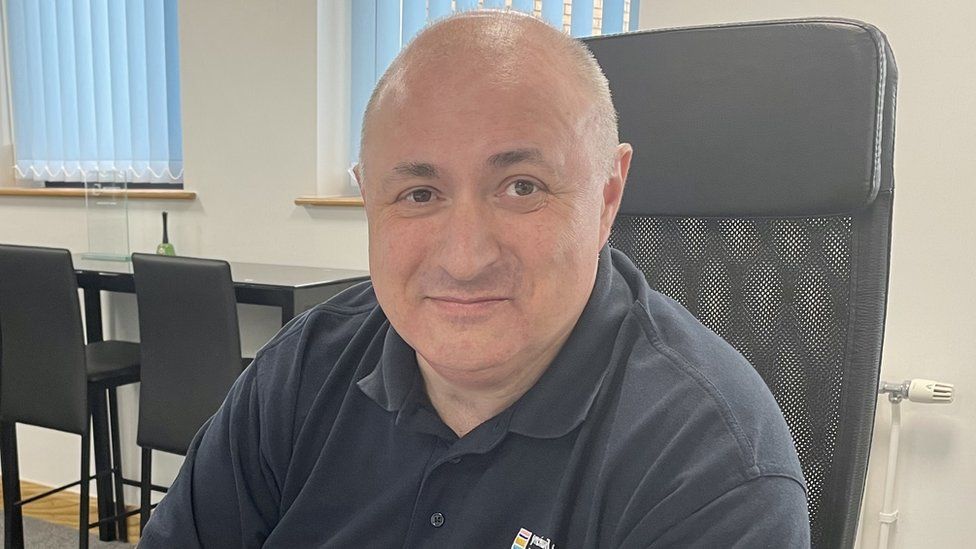
“If we can diagnose cancers earlier, they’re much more easy to manage”, says Dr Lee Campbell, of Cancer Research Wales
Cancer care should improve if more GPs get better at identifying symptoms sooner, a charity says.
Doctors are being encouraged to focus on the disease by an initiative called “ThinkCancer!” when patients present with possible vague signs.
One cervical cancer survivor said doctors spent a year wrongly believing her symptoms were due to perimenopause.
Cancer Research Wales has invested about £1m in a scheme to improve knowledge of cancer in primary care.
Siwan Bowen, from Cardiff, went to see her GP in 2015 after she developed symptoms which she thought were a sign of cervical cancer.
“Because I’d had a smear test the previous year which was clear, the doctor said it couldn’t be cancer and it must be something else,” she said.
“That eased my mind in a way. So for a year I was going back and forth to the doctor with the same symptoms.
“I was tired and felt something wasn’t right and we started to think it might have been perimenopause.”
She eventually decided to have a coil put in to try to ease the bleeding, and during that hospital appointment, she was told she had cancer.
“If I’d been diagnosed sooner then I wouldn’t have had to go through having radiotherapy, chemotherapy and brachytherapy,” says Siwan Bowen
“It was a huge shock, especially after spending so much time going back and forth to see the GP but then a year later finding out I had stage three cervical cancer,” she said.
“If I’d been diagnosed sooner then I wouldn’t have had to go through having radiotherapy, chemotherapy and brachytherapy. It was an awful experience.”
To help earlier diagnosis, a programme has been rolled out across primary care services in Wales to improve how GP surgeries consider and manage suspected cancer symptoms.
The Think Cancer initiative encourages primary care providers to take a uniform approach to dealing with potential cancer symptoms.
Research by Cancer Research Wales showed that more than 60% of patients visit their GP when they have symptoms which could be linked to cancer. It is often the responsibility of primary care providers to seek the right referral and tests for a patient.
Dr Lee Campbell, head of research at the charity, said: “We undertook a series of workshops of GPs across Wales to see what they lacked or required to help them identify or suspect cancer in a more informed manner.
“If we can transform primary care into centres of diagnostic excellence for cancer then we will make a significant improvement at the very first point of patient contact.
Red flag symptoms
“If we can diagnose cancers earlier, they’re much more easy to manage and cure and also the cost of treatment overall is significantly reduced.”
As part of the new initiative, receptionists will also be given training to identify red flag symptoms of cancer and raise concerns with GPs. However, they will not make any clinical decisions.
Patients will also be followed up more closely by “safety net champions” – people in a primary care setting tasked with checking up on patients who presented with vague symptoms or who have been referred to secondary care.
National cancer clinical director Prof Tom Crosby said: “Whilst we encourage the public to come forward with signs and symptoms of cancer we also need to ensure the system is enabled to meet this demand. Currently it is not and our cancer outcomes are poor.
“It is vital that primary and community services have the capacity to review patients carefully, the expertise and technology to investigate them where appropriate and the access to specialist diagnosis and treatment when it is required.
“ThinkCancer! is a major cancer service development that Wales should be proud that it is leading on and will be key to improving cancer patient outcomes.”
However, reflecting on her experiences, Ms Bowen said: “I’m completely supportive of this campaign. I’ve been all clear for five years but I do feel a little let down by the system.
“It was a terrible experience at the time so if there is a way to help ensure people don’t have to go through that then we have to work towards it. We have to work together to improve early diagnosis.”
The Welsh government said it welcomed any initiative helping with the earlier diagnosis of cancer.
“Rapid diagnostic clinics are available in almost all parts of Wales and play an important role improving cancer outcomes. They provide GPs with an additional referral option when they suspect cancer, but the patient does not meet the criteria for a suspected cancer referral,” it said.
“Our quality statement for cancer sets out that we want to detect more cases earlier and at more treatable stages though timely access to diagnostic interventions and our recovery and transformation strategy describes how more capacity will be created.”








